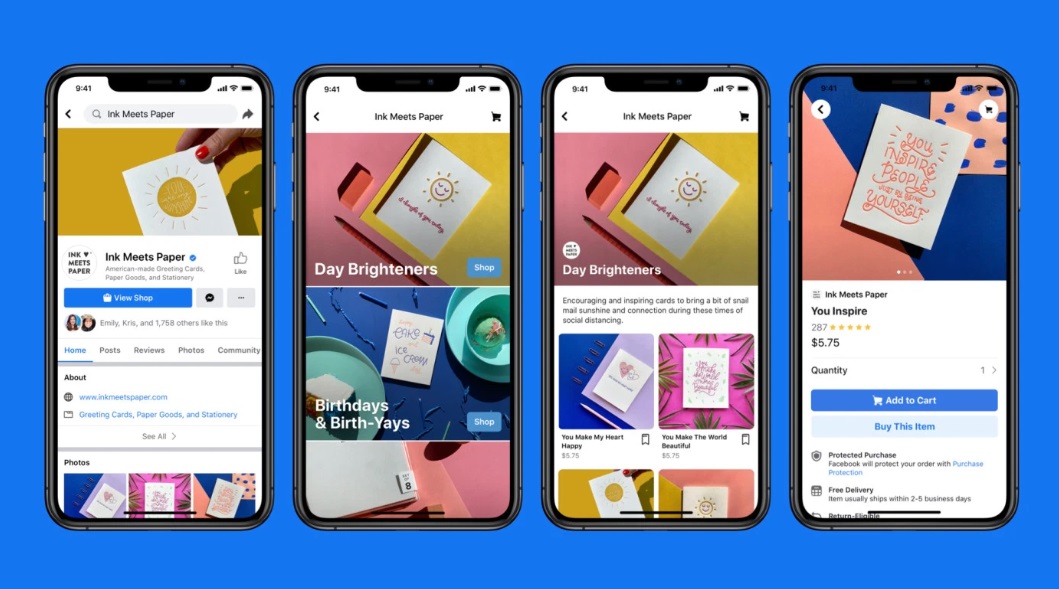Facebook is making another big push to become the go-to platform for online shopping, giving the likes of Amazon competition in the ecommerce space.
CEO Mark Zuckerberg announced the new Facebook Shops feature on a livestream on the platform last week.
The service will allow Facebook pages to set a shop up for free, upload their catalogues, and feature specific products.
Facebook users will then be able to browse these shops, and then save or eventually purchase products directly on the social media platform.
Most of these features have already been available on Facebook in some form, but they have now been repackaged into Shops, with Zuckerberg the driving force behind the attempt to conquer ecommerce.
“This is really the first very major push that we’re going to be making into that next step around commerce,” Zuckerberg said.
“All these tools are open for business even when your physical storefront can’t be.”
Zuckerberg said he has been meeting with Facebook’s small business commerce team every day during the pandemic, and these features will help SMEs make it through the ongoing COVID-19 crisis.
“As many businesses are creating and strengthening their digital presence, we’re building new tools to help make online shopping seamless,” the company said in a blog post.
“That’s why we’re launching Facebook Shops and investing in features across our apps that inspire people to shop and make buying and selling online easier.
“Facebook Shops is a mobile-first shopping experience where businesses can easily create an online store on Facebook and Instagram for free.
“Shops let you choose which of your items you want to feature, merchandise with product collections and tell your brand story with customisable fonts and colours.”
Partners on the project include Shopify, BigCommerce, WooCommerce, Chanel Adviser, CedCommerce, Cafe24, Tienda Nube and Feedonomics.

Facebook Shops. Photo: Supplied.
Spend, spend, spend!
Through Facebook Shops, businesses will be able to connect with customers through Facebook’s various platforms, including WhatsApp, Messenger or Instagram Direct.
It will also be available on Facebook and Instagram live, allowing users to buy products being featured on livestreams.
“It’s one simple and consistent experience across this family of apps, which means it is easier for people,” Zuckerberg said. “That of course means there’ll be higher conversions and more sales for small businesses.”
Facebook already has its used goods Marketplace feature and has offered product catalogues on business pages for several years.
But the new push with Facebook Shops marks a renewed effort from the tech giant to get people to actually buy things on the platform, rather than to just redirect them to other sites through ads.
For the moment, most purchases will still be made away from Facebook and on the company’s actual website, although the tech giant is trialling Checkout, a currently invitation-only program that can conduct transactions on the site.
Facebook will take a small commission on purchases made through Shops, but the real lucrative area for the company is through driving more ads on the platform.
“Our business model here is ads, so rather than charge businesses for Shops, we know that if Shops are valuable for businesses they’re going to, in general, want to bid more for ads,” Zuckerberg said. “We’ll eventually make money that way.”
The launch of Facebook Shops was accelerated in light of the COVID-19 pandemic, Facebook Australia director Naomi Shepherd said.
“Over the past three months businesses of all sizes have been forced to change their business models and adapt to selling online, Shepherd told the Sydney Morning Herald. “We’ve seen this and worked hard to fast track new products to give businesses a better way of connecting with consumers, and helping businesses who don’t have an online presence to drive sales online.
“We want to make it easy to set up a single online store for customers to access on Facebook and Instagram. If you visit someone’s shop, you’ll be able to learn that business’ story, see their featured products, and buy them in our apps.”










